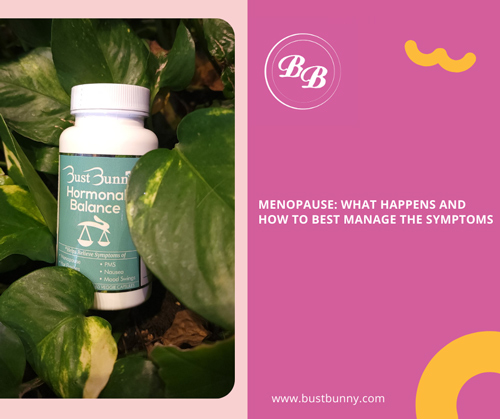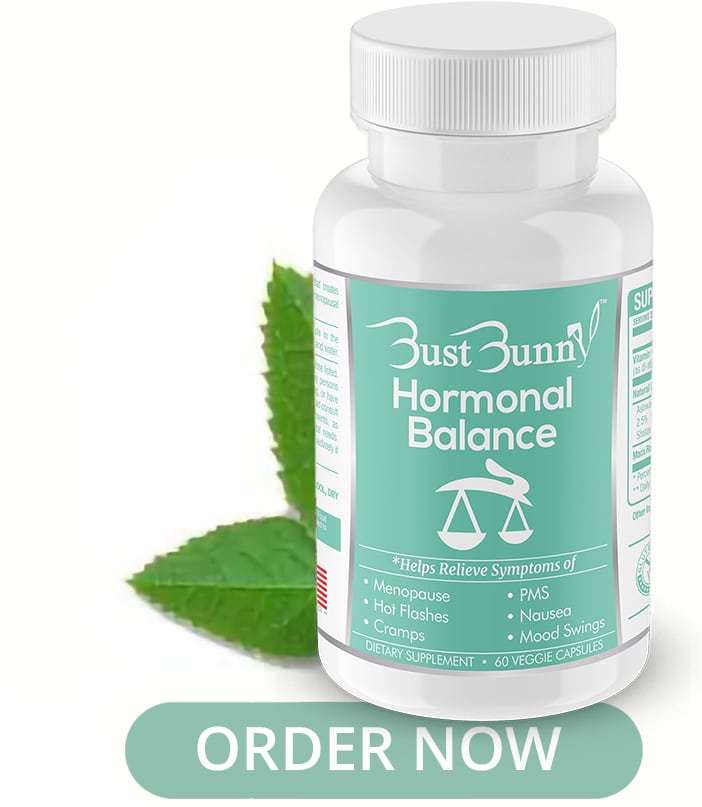Menopause marks the end of your fertile and reproductive years. It’s the point at which you stop receiving your period for at least 12 consecutive months.
It typically occurs in your late 40s or early 50s when your ovaries stop producing the hormones that control ovulation and menstruation, namely, estrogen and progesterone.
Although menopause is a natural part of aging, it can occur prematurely due to reasons like a woman having her uterus removed (hysterectomy) or her ovaries damaged by procedures like chemotherapy or radiation.
Natural menopause is slow and can last as long as 14 years, depending on genetics and lifestyle factors, physical fitness, diet, smoking, race, and ethnicity.

Furthermore, it occurs in three stages during which you’ll encounter different symptoms:
- Perimenopause: Begins 8–10 years before menopause when estrogen production starts to subside. It lasts until menopause and many women experience menopausal symptoms during this time.
- Menopause: You’re diagnosed with menopause when you’ve not had your period for a year.
- Postmenopause: It’s the rest of your life after you’re diagnosed with menopause.
Menopause is accompanied by a variety of physical, psychological, and emotional changes.
Below, we discuss the most common symptoms among a majority of women.
We’ll also take you through managing the symptoms with hormone replacement therapy, lifestyle changes, and natural hormone replacement supplements.
Change 1 – Hot Flashes and Night Sweat

Hot flashes are the most common menopausal symptom. You’re likely to experience this symptom during all three stages of menopause.
Hot flashes are characterized by a sudden flare of heat that often only affects the top half of your body. The heat flash may be accompanied by sweating, flushed skin, and followed by a cold shiver.
Hot flashes also vary in severity, frequency, and duration. For instance, they can be mild or strong enough to disrupt your sleep and everyday life.
They often last between 30 seconds and 10 minutes and can occur a few times a day or a few times a week. They can also happen at night, when they’re referred to as “night sweats”.
There are many factors that trigger hot flashes, including:
- Hot weather or intense heat
- Caffeine
- Alcohol
- Spicy foods
- Smoking
- Tight clothing
- Stress
Change 2 – Vaginal and Urinary Tract Issues
One very common problem among menopausal women is vaginal atrophy—the thinning and drying of the vaginal and urethral tissues. It is characterized by a thinning endometrium and disrupted vaginal pH.
It’s caused by decreased estrogen levels and has symptoms that affect both the vagina and urinary tract. These include:
- Vaginal dryness
- Burning or inflammation of the vagina
- Itchiness in your genitals
- Urinary tract infections
- Unusual vaginal discharge
- Reduced lubrication and pain during sex
Your attitude and feelings about sex may also change. You’ll either lose interest due to the negative symptoms, such as pain during sex, or you’ll become freer about it because of decreased fear of pregnancy.
Other than vaginal atrophy, you may experience urinary incontinence—difficulty holding urine due to relaxation of the pelvic muscles. This may be accompanied by burning when you pee and a need to pee often.
Change 3 – Weight Gain
Weight gain during menopause isn’t necessarily a universal symptom as it’s influenced by a variety of other factors, including age, genetics, hormones, diet, and lifestyle.
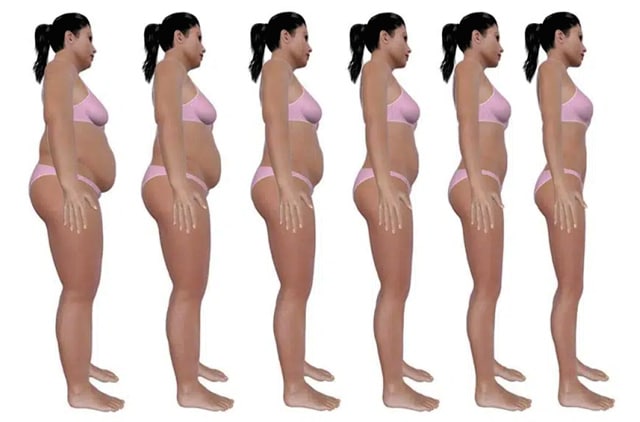
The primary contributors to weight gain during menopause include:
- Declining estrogen levels, which reduce your body’s metabolic rate. Additionally, when your estrogen levels are low, there’s a likelihood that you’ll eat more and be less active.
- A change in hormone levels may result in disrupted fat distribution patterns. For instance, in pre-menopause, fat is stored in the lower body, while in postmenopause, fat is stored around the abdomen.
- Decreased muscle mass lowers resting metabolism. As a result, your body doesn’t efficiently burn calories.
- Reduced physical activity increases your chances of gaining weight during menopause. As you age, you need to increase the time and intensity of your exercises to achieve weight loss.
In some cases, you may even experience breast growth and a fattier back as a result of hormonal imbalances.
Weight gain is undesirable for many women, however, it doesn’t have to go hand-in-hand with menopause. The best way to prevent it is by checking your diet, increasing physical activity, and taking natural hormonal balance supplements.
Change 4 – Psychological and Emotional Distress
Menopause often has the same psychological and emotional effects as premenstrual syndrome. It is, therefore, common for women with a history of mental health conditions, such as anxiety and depression to relapse during this time.
The main culprit for mental health problems during menopause is hormone changes. Additionally, other symptoms of menopause, including hot flashes, insomnia, and weight gain may cause you to feel distressed and cause emotional strain.
The emotional strain can manifest in the form of mood swings, irritability, sadness, lack of focus, and lack of motivation.
Mental health during menopause can also be affected by:
- Financial and career changes
- The end or start of romantic relationships
- The burden of caring for aging parents
- The stress of dealing with children moving out of or back home
- Difficulty managing one’s life expectations
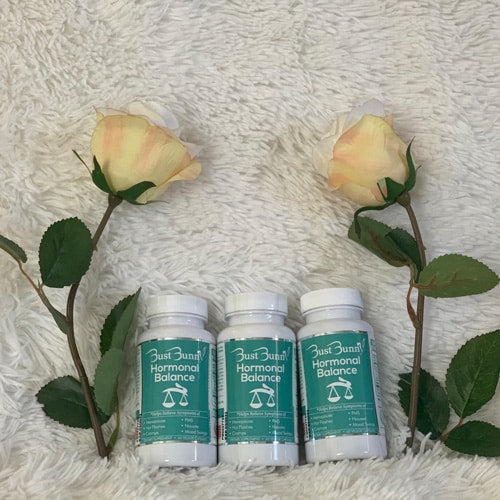
Change 5 – Sleep Disturbances
Sleep problems induced by other menopause symptoms, such as night sweats, anxiety, and urinary incontinence are common.
You may experience any of the following sleep problems during menopause:
- Difficulty falling asleep
- Difficulty staying asleep
- Poor sleep quality
- Fatigue or sleepiness during the day
- Restless leg syndrome
Menopausal women are also at a high risk of sleep apnea—a sleeping disorder characterized by loud snoring, inconsistent breathing, and feeling tired even after a full night’s sleep.
Progesterone and melatonin are two hormones with sleep-inducing effects. During menopause, their production also decreases, leading to sleep disturbances.
What Is Hormone Replacement Therapy for Menopausal Women?
Hormone Replacement Therapy (aka HRT) is a treatment method that involves administering estrogen to help resolve the hormonal imbalance associated with female menopause. Hence, it may sometimes be referred to as estrogen replacement therapy.
However, for women who’ve undergone a hysterectomy, estrogen may be prescribed along with progesterone or progestin to prevent the growth of the uterine lining, which increases your risk of endometrial cancer.
There are various forms of HRT prescribed during perimenopause or menopause, depending on the type and severity of symptoms you’re experiencing, including:
- Tablets
- Patches
- Implants
- Estrogen gel
- Vaginal estrogen
Unfortunately, HRT may not be effective for every woman, and it comes with some adverse side effects, including:
- Headaches
- Leg cramps
- Nausea
- Breast Tenderness
- Vaginal bleeding and enlargement
- Lower abdominal pain
- Depressed moods
- Skin irritation; common when using the gel and patch
Hormone Replacement Therapy vs. Natural Hormone Replacement
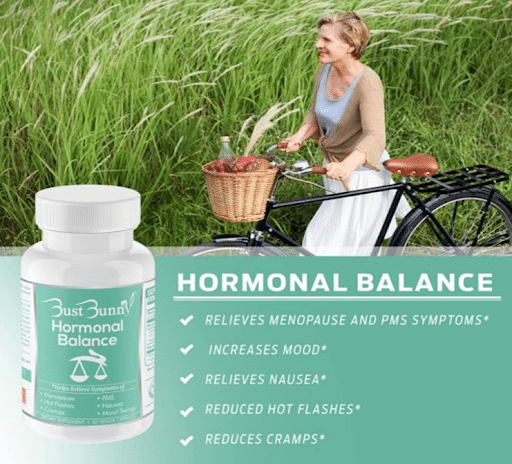
You can kick the side effects of HRT to the curb by using natural hormone replacement supplements.
Bust Bunny’s Hormonal Balance supplements are the holy grail for women struggling with menopausal and PMS symptoms due to hormonal imbalances.
Our Hormonal Balance supplements contain carefully selected herbs and botanicals that help combat menopausal symptoms. The supplements balance your hormones and relieve a variety of menopausal and PMS symptoms.
Many of our customers are happy to have found relief thanks to our all-in-one solution.
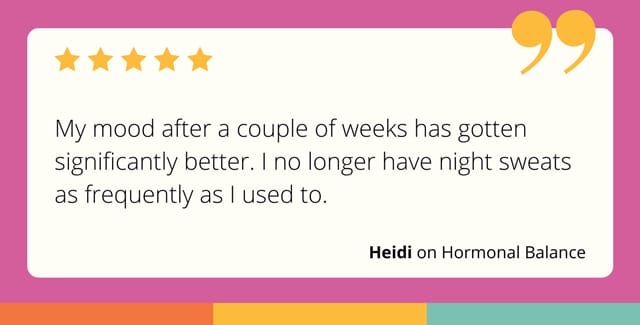
The secret to our formula is in the ingredients. The table below highlights some of these ingredients and the symptoms they help to relieve.
| Herb | Description | Symptoms It Helps With |
| Ashwagandha | A native Indian herb used for centuries to support hormone balance, relieve insomnia, and improve sleep quality |
|
| Black Cohosh | A herb native to North America that has similar effects as HRT |
|
| Dong Quai |
|
|
| Red clover | A flower that contains isoflavones similar to estrogen and is used to make a variety of medicines |
|
| Shatavari | A wild asparagus variety known to treat menopausal symptoms in women |
|
Frequently Asked Questions
Is HRT recommended for everyone?
HRT is not recommended for women with underlying health conditions such as blood clots, stroke, and cardiovascular diseases.
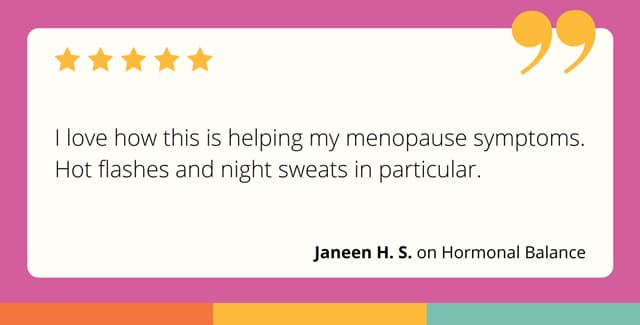
What are the best foods for hormone balancing?
Good fats and proteins help to ensure optimal hormone production. You should also boost your vitamin B intake to increase progesterone levels and prevent hormonal disturbances.
B vitamins help to overcome psychological and emotional menopause symptoms by triggering your brain and improving its functions.
Is a good diet alone enough to relieve menopausal symptoms?
No. For best results, combine your improved diet with other lifestyle changes, such as:
- Exercising regularly
- Getting sufficient sleep
- Releasing stress
- Avoiding alcohol, coffee, and smoking
Share on Instagram:
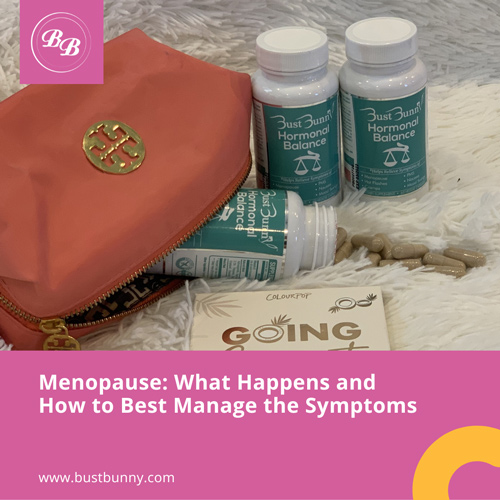
Share on Facebook:
